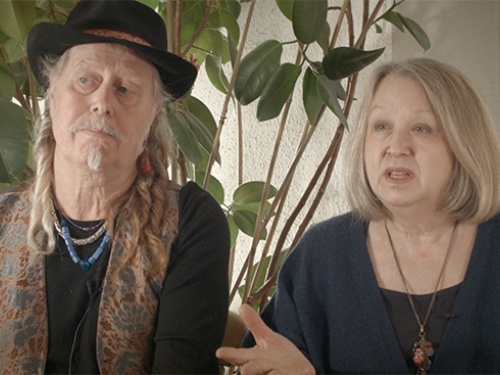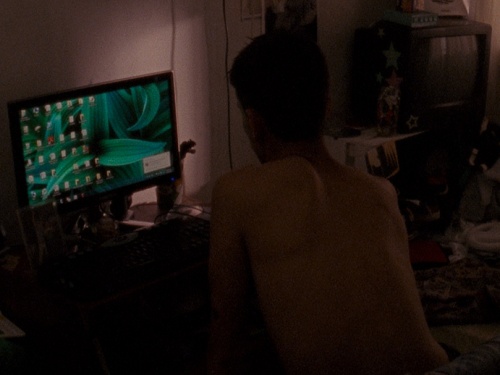"Nestled in all that street grimy stuff is hope": an Arts Educator on the Importance of Time is Illmatic
Ahead of the Cinemania screening of Time is Illmatic, educator Rita Cottone spoke to director One9 and hip-hop researcher Martha Diaz, reflecting on the film's importance for young people and how she came to question assumptions about hip-hop.
Time is Illmatic
Gangstas. Crews. Clubs. Explicit. These are the words that come to mind when I’m asked to watch Time is Illmatic. The documentary about hip-hop is part of the ICA's Learning Programme and Cinemania, a series of film screenings and talks for young people taking place across London.
Learning programme? Young people? The educator in me is struggling. I’ve seen most of the ICA Learning Film Programme over the last 12 months. The films have been used to engage, inspire and educate young audiences, to help them to question. Although I am a fan of hip-hop, I wonder how exactly a documentary about Nasir 'Nas' Jones' groundbreaking 1994 hip-hop album Illmatic will link to the curriculum? How will exposing young people to explicit lyrics work? What will they learn?
Fast forward 74 minutes and my eyes are as wide as the cup I'm guzzling coffee from. I'm fascinated by what I’ve seen. I berate myself for my initial assumptions, which the documentary challenges by presenting much more than an outline of the success of Nas’s Illmatic. It’s about what influenced the album: the harsh environment of Queensbridge, the largest housing project in New York, and the myriad social problems there. It looks at Nas and the generation of young black men who were growing up surrounded by a crack epidemic, racial segregation, prison, crime and violence. Nas gave a voice to these issues through Illmatic. It is distressing viewing at times. I have to pinch myself. I'm merely watching a documentary; these were and still are the harsh realities of life for many.
Street Dreams: Interviews with One9 and Martha Diaz
I am lucky to get an interview with One9, the director and producer of Time is llmatic. In 2004 he decided, along with writer and producer Erik Parker, that he wanted to not only show the musical roots of hip-hop but to also tell a human story about survival, about what people living in Queensbridge faced.
“It was important to capture the different layers that were involved in Nas’s experience – the drugs, crime, violence. We wanted to show what hip-hop brought to that situation. Nas encapsulated his experience into a piece of art that was so moving. People could relate to it,” he tells me.
"We used the titles of the tracks from Illmatic as starting points to tell a greater story. It’s about identifying social issues like the drop-out rate and drug invasion. The track New York State of Mind was about the effect that environment had on people. Life’s a Bitch was about how the environment affected the family. The documentary is saying ‘here’s a kid who’s inspirational’. Not just because of his talent as a hip-hop artist but because he represented a way of life, a way of transcending his situation through his art. We wanted to highlight that."
In the documentary, Nas's father, the jazz musician Olu Dara, says that "enrolling Nas into school was like enrolling him into hell." As an educator, this line stands out for me. Nas’s life, as a black male high school dropout growing up in Queensbridge, should have statistically been one that offered limited opportunities. I ask One9 how, in his opinion, Nas was able to escape this.
“He was lucky. He was able to see beyond Queensbridge. He spent summers outside of New York visiting his family in Natchez. He had a father who opened him up to new ideas through books and made him curious about the world. The film is about being open to going beyond what might be expected, to take it upon yourself to define who or what you want to be. I guess the shots where we filmed from high up were part of that narrative. It’s also about audiences getting beyond their own perspectives.”
Martha Diaz, one of a growing number of academics currently trying to unpack the cultural tangle that is hip-hop, agrees. “Hip-hop galvanises young people” she says “it has the potential to inspire and encourage people to learn, to go to college, to expand their options.” Martha is currently developing an educational curriculum alongside Time is Illmatic, which includes learning about the education system, housing, restorative justice, hip-hop music and entrepreneurship.
I ask Martha how hip-hop, a music style known for glamorising the gangsta lifestyle, can teach young people. Martha tells me that’s not the full picture. “Hip-hop is about what’s happening. Why can’t we have a dialogue about it?” She steers me to her paper, The World is Yours to give me a better idea of what hip-hop is: "an art form, lifestyle, communication tool for human rights and peace rooted in an ancient culture. It has many elements that shape its principles, philosophy, and aesthetics."
Reflections
I think about my initial assumptions and wonder what associations come to mind when people think about not just hip-hop culture but about housing estates. I am reminded that Nas defeated the odds. Of the lyrics Nas wrote for Illmatic, hip-hop artist QTip says: "nestled in all that street grimy stuff is hope." The same could be said for the documentary.
The strong message of hope would work well in classrooms, particularly with groups of disaffected young people. Time is Illmatic is a powerful educational tool. Like other documentaries and films, it can open dialogues, build skills, inspire and challenge assumptions.
At the end of the film, in a speech at Harvard University, Nas says that in his early years he didn’t believe that the system believed in him. Most teachers have seen this sentiment written across too many of the faces that come into their classrooms. Breaking through that, however, is very difficult. Empowering people so that they have options in life beyond what they are born into is imperative. Education can start that process. Films and documentaries can be part of this. I am keen to watch how Martha’s education curriculum around Time is Illmatic develops as well as how the growing number of film programmes targeting young people evolve.■
Time is Illmatic is screened on March 11 at the ICA, part of the Cinemania Film programme.
This article is posted in: Articles, Blog, Film, Interviews, Music
Tagged with: Time is Illmatic, arts education, learning, The State of Education Today, One9, Martha Diaz, Rita Cottone, interview, Article, Film, Hip-hop, Documentary, Cinemania, Music





